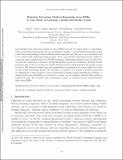Robustly Extracting Medical Knowledge from EHRs: A Case Study of Learning a Health Knowledge Graph
Author(s)
Chen, Irene Y; Agrawal, Monica; Horng, Steven; Sontag, David
DownloadPublished version (728.2Kb)
Publisher with Creative Commons License
Publisher with Creative Commons License
Creative Commons Attribution
Terms of use
Metadata
Show full item recordAbstract
© 2019 The Authors. Increasingly large electronic health records (EHRs) provide an opportunity to algorithmi-cally learn medical knowledge. In one prominent example, a causal health knowledge graph could learn relationships between diseases and symptoms and then serve as a diagnostic tool to be refined with additional clinical input. Prior research has demonstrated the ability to construct such a graph from over 270,000 emergency department patient visits. In this work, we describe methods to evaluate a health knowledge graph for robustness. Moving beyond precision and recall, we analyze for which diseases and for which patients the graph is most accurate. We identify sample size and unmeasured confounders as major sources of error in the health knowledge graph. We introduce a method to leverage non-linear functions in building the causal graph to better understand existing model assumptions. Finally, to assess model generalizability, we extend to a larger set of complete patient visits within a hospital system. We conclude with a discussion on how to robustly extract medical knowl-edge from EHRs. Supplementary material: http://clinicalml.org/papers/ChenEtAl PSB20 suppl.pdf.
Date issued
2020-01Department
Massachusetts Institute of Technology. Department of Electrical Engineering and Computer ScienceJournal
Pacific Symposium on Biocomputing
Publisher
World Scientific Pub Co Pte Lt
Citation
Chen, Irene Y, Agrawal, Monica, Horng, Steven and Sontag, David. 2020. "Robustly Extracting Medical Knowledge from EHRs: A Case Study of Learning a Health Knowledge Graph." Pacific Symposium on Biocomputing, 25 (2020).
Version: Final published version